Inside Oku Kos beach hotel in Greece
With an entire benchtop of cakes, the breakfast offerings at this resort on a remote Greek island is something to write home about.

Hippocrates, the father of medicine, was born on Kos. I know this because every proud Koan – and there is no other kind – reminds me of their famous forebear at every opportunity. The Ancient Greek physician, who ran a hospital here in the fifth century BC, is remembered for many wise insights into the human condition, including the belief that “Nature is sufficient in everything for everyone”.
I can’t fault his logic as I’m sitting bathed in sunshine on the deck of To Kima (“Wave”) restaurant at Oku Kos, gazing beyond sand dunes to a luminous blue strip of Aegean Sea and sky. The islands of Plati and Kalymnos shimmer on the horizon as a lithe, Lycra-clad trio files along the tamarisk-lined boardwalk to the 9.30am beach yoga class.
I’d join them but I’m busy working my way through one of the most expansive breakfast buffets of my career; a cornucopia of local and organic ingredients, including whole and dried fruits, lashings of dense yoghurt, cheese pie and an entire benchtop of cakes. Hippocrates was always going on about the importance of diet so I imagine he’d approve of my current situation.
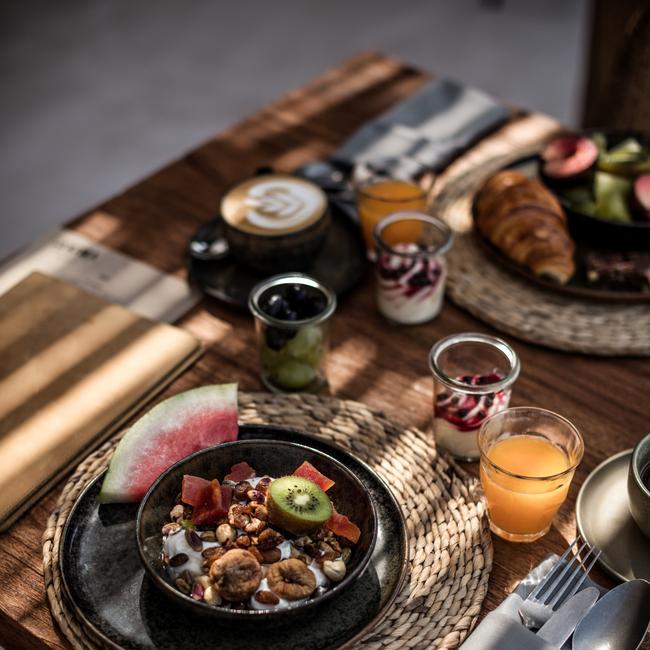
Kos is the third-largest of Greece’s Dodecanese group, located in the southeastern Aegean next door to Turkey. Oku sits at the quieter, northern end of the island beside a beach of creamy sand and mottled blue waters. Its 100 guestrooms, half of them suites, are Cubist hideaways with courtyards and, in some, private pools. With their palapa-style roofs, hammocks and a semi-arid coastline, at times it feels like I’m staying on Mexico’s Pacific coast. But the scent of Mediterranean herbs and cobalt flash of Aegean from my pool deck remind me otherwise.
Oku’s staff are mostly Greek and most have been here for years. The camaraderie shows. “We work here for every day for seven months, so it’s our house as well,” says resort general manager Iraklis Pelegris. “You treat people like they are guests in your house.”
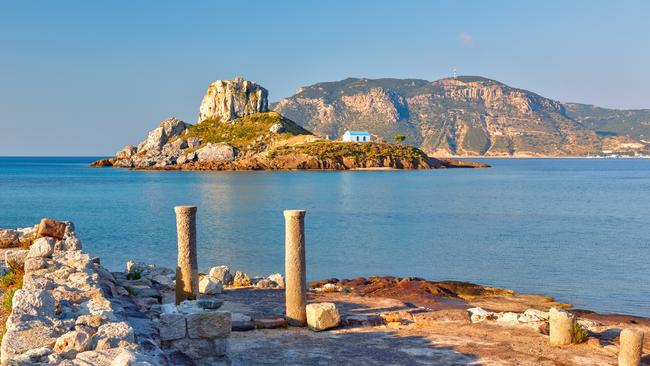
They certainly do. I arrive into Kos airport from Athens after 10pm to find driver Irena waiting for me. “People say we are very welcoming, that we have got our hearts and our hands open,” she answers when I ask what distinguishes Koans from other islanders. Despite the late hour, guest experience manager Elena has stayed back to welcome me. She gives me a quick rundown of what Oku Kos is about, “The island is quite popular because Hippocrates was born and raised here,” she says, and then wraps me in a hug before leaving.
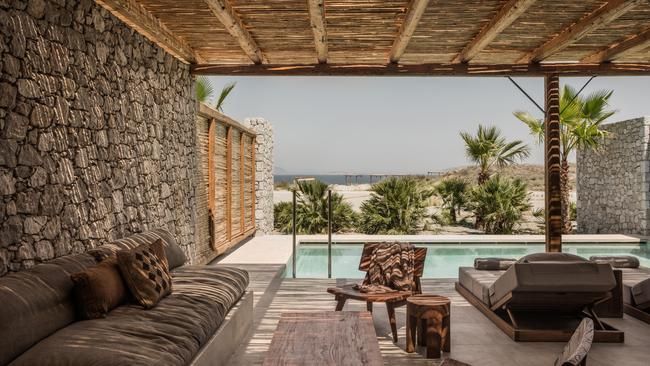
Next morning I wake to the sight of farmers working their crops in the neighbouring field, the sea shimmering just beyond. My 65sqm pool suite is emphatically minimalist, with rough-hewn timber furnishings and textured interiors of concrete and hessian. The excess is in the extras: a sunken lounge with a drinks tray of bottled cocktails (try the fennel negroni), 200ml spirits and Kos wines; a patio and deck with fringed hammock; a square pool edged in date palms, and all the mod-cons from coffee machine to Marshall speakers.
As well as beachfront To Kima restaurant and bar there’s a palm-fringed main pool, a beach club with yoga decks, bar and brisk little waves, an extremely tasteful boutique and a three-room spa that’s perpetually booked (the Anatripsis Massage, “inspired by the principles of the physician Hippocrates”, is most popular). A gym, hammam, sauna and heated indoor pool are in the same complex.
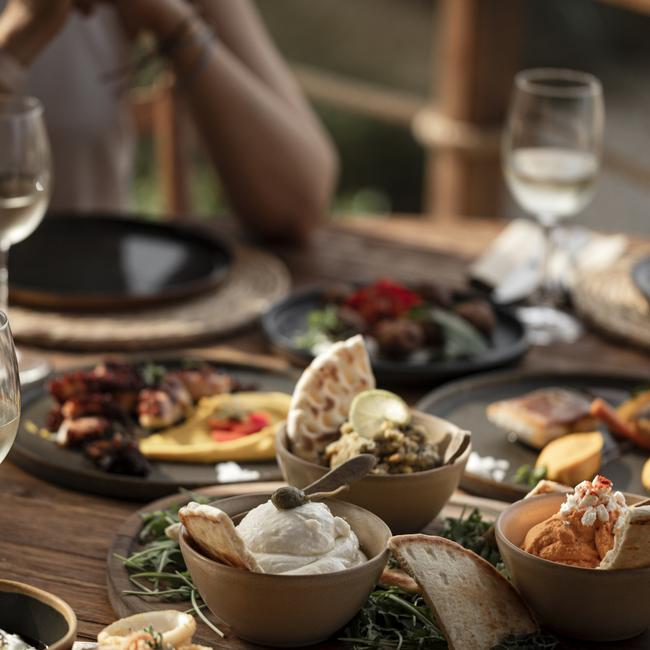
Most guests stay for a week and, while relaxation is key, there’s a roster of activities to keep things interesting. Mondays are open-air cinema night with popcorn. There’s stargazing with a guest astronomer on Tuesdays, beach party Wednesdays (where Pelegris might appear atop the dunes performing his signature fire-eating trick), sunset yoga, horse riding and watersports. There are also day trips to neighbouring islands and to Turkey; it’s a 40-minute ferry ride to Bodrum.
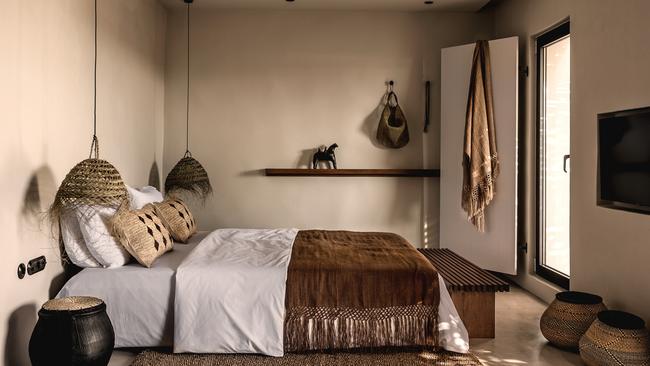
Oku Kos is relatively remote. Ideally you’d book a car to get around (hire companies deliver vehicles to the hotel) or Oku can arrange a driver/guide such as Vangelis Dimitriadis, who picks me up after lunch to show me around his home. Urbane and well-travelled, Dimitriadis tells me he always comes back to Kos because “the people here are still friendly with kindness. They still know how to live.”
First stop: the Aleppo pine forests of Plaka, where peacocks, some in full display mode and even a pure-white albino one, wander freely. We visit the UNESCO World Heritage site of Asclepion, where Hippocrates trained and ministered to the sick, and the touristy village of Zia on Mount Dikaios for panoramic views over the island chain. We admire many alluring beaches, the tiny island of Agios Stefanos with its blue-domed chapel, and the Venetian-looking streetscapes of Kos town with its pretty waterfront, medieval castle and ancient agora. En route we pass dry-stone walls, animal enclosures and wizened farmers in fields. The old ways persist on Kos.
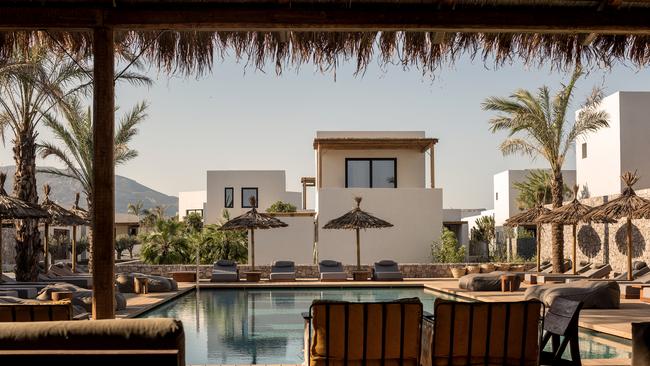
We’re back at Oku in time for sunset, an obligatory resort pastime. I order a glass of chilled Greek white as the sky burns with colour and head chef Michalis Chondrompilas nourishes me with delicious shrimp saganaki and a showstopping giouvetsi of chargrilled short-rib in a rich, flavour-packed orzo pasta. Chondrompilas adds an unorthodox dash of cream to his recipe and I don’t want to eat it any other way now. Pelegris’s mum reckons Chondrompilas makes a better giouvetsi than she does.
We part with a hug and a promise I will return and stay at least a week, so I can watch a movie, gaze at the stars and party with him on the beach. “I love you!” he cries. My heart is full too.
In the know
Oku Kos is open from April until the first week of
November each year. From €414 ($675) a person a night, with breakfast. Guests 16 and over only. The island is a one-hour direct flight from Athens.
Kendall Hill was a guest of Oku Kos.
If you love to travel, sign up to our free weekly Travel + Luxury newsletter here.

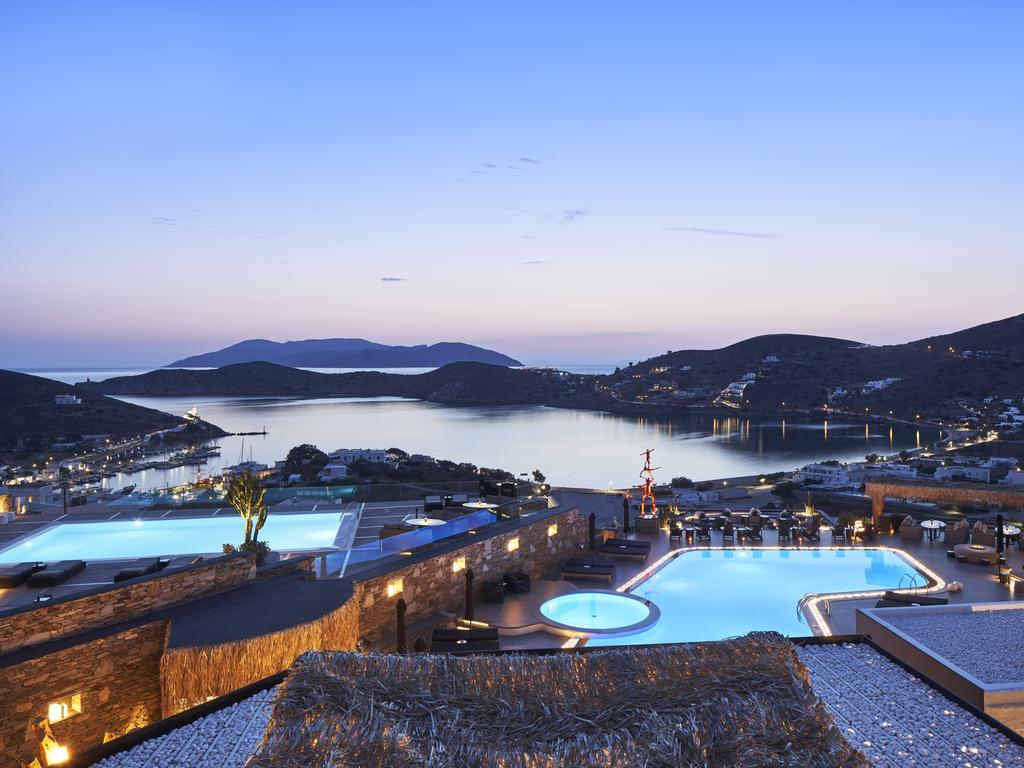
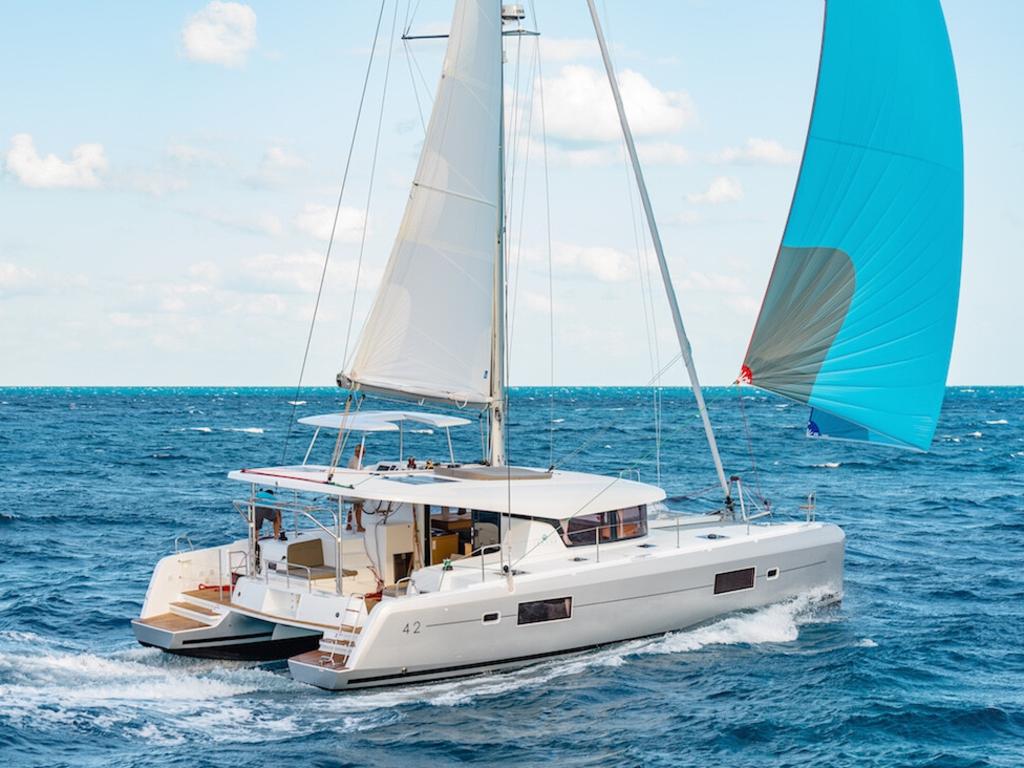

To join the conversation, please log in. Don't have an account? Register
Join the conversation, you are commenting as Logout